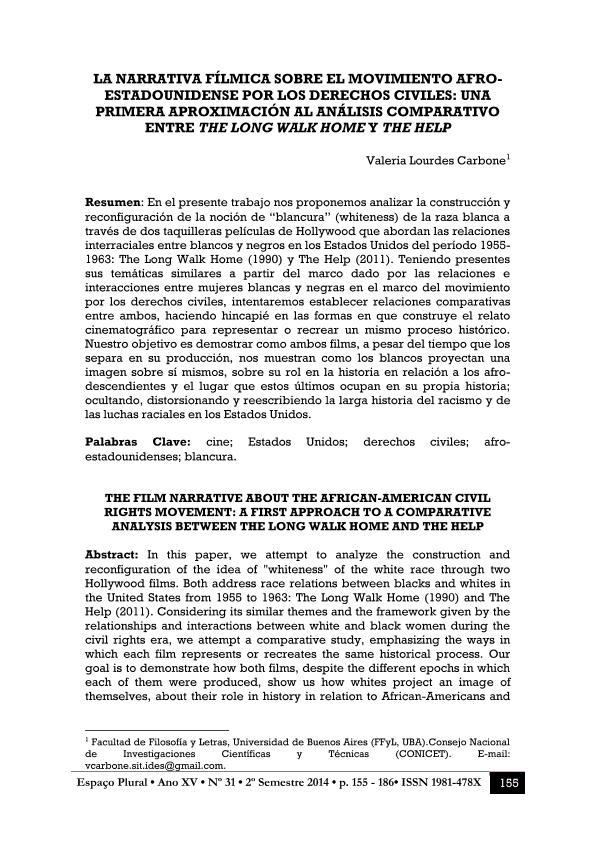Mostrar el registro sencillo del ítem
dc.contributor.author
Carbone, Valeria Lourdes

dc.date.available
2018-04-10T20:26:34Z
dc.date.issued
2015-06
dc.identifier.citation
Carbone, Valeria Lourdes; La narrativa fílmica sobre el movimiento afro-estadounidense por los derechos civiles: Una primera aproximación al análisis comparativo entre The Long Walk Home y The Help; Universidade Estadual do Oeste do Paraná; Espaço Plural; 15; 31; 6-2015; 155-186
dc.identifier.issn
1518-4196
dc.identifier.uri
http://hdl.handle.net/11336/41624
dc.description.abstract
En el presente trabajo nos proponemos analizar la construcción y reconfiguración de la noción de “blancura” (whiteness) de la raza blanca a través de dos taquilleras películas de Hollywood que abordan las relaciones interraciales entre blancos y negros en los Estados Unidos del período 1955- 1963: The Long Walk Home (1990) y The Help (2011). Teniendo presentes sus temáticas similares a partir del marco dado por las relaciones e interacciones entre mujeres blancas y negras en el marco del movimiento por los derechos civiles, intentaremos establecer relaciones comparativas entre ambos, haciendo hincapié en las formas en que construye el relato cinematográfico para representar o recrear un mismo proceso histórico. Nuestro objetivo es demostrar como ambos films, a pesar del tiempo que los separa en su producción, nos muestran como los blancos proyectan una imagen sobre sí mismos, sobre su rol en la historia en relación a los afrodescendientes y el lugar que estos últimos ocupan en su propia historia; ocultando, distorsionando y reescribiendo la larga historia del racismo y de las luchas raciales en los Estados Unidos.
dc.description.abstract
In this paper, we attempt to analyze the construction and reconfiguration of the idea of "whiteness" of the white race through two Hollywood films. Both address race relations between blacks and whites in the United States from 1955 to 1963: The Long Walk Home (1990) and The Help (2011). Considering its similar themes and the framework given by the relationships and interactions between white and black women during the civil rights era, we attempt a comparative study, emphasizing the ways in which each film represents or recreates the same historical process. Our goal is to demonstrate how both films, despite the different epochs in which each of them were produced, show us how whites project an image of themselves, about their role in history in relation to African-Americans and he place the latter have in their own history; concealing, distorting and rewriting the long history of racism and racial struggles in the United States.
dc.format
application/pdf
dc.language.iso
spa
dc.publisher
Universidade Estadual do Oeste do Paraná
dc.rights
info:eu-repo/semantics/openAccess
dc.rights.uri
https://creativecommons.org/licenses/by-nc-sa/2.5/ar/
dc.subject
Cine
dc.subject
Estados Unidos
dc.subject
Afro-Estadounidenses
dc.subject
Derechos Civiles
dc.subject.classification
Historia

dc.subject.classification
Historia y Arqueología

dc.subject.classification
HUMANIDADES

dc.title
La narrativa fílmica sobre el movimiento afro-estadounidense por los derechos civiles: Una primera aproximación al análisis comparativo entre The Long Walk Home y The Help
dc.title
The film narrative about the african-american civil rights movement: a first approach to a comparative analysis between The Long Walk Home and The Help
dc.type
info:eu-repo/semantics/article
dc.type
info:ar-repo/semantics/artículo
dc.type
info:eu-repo/semantics/publishedVersion
dc.date.updated
2018-04-10T14:19:20Z
dc.identifier.eissn
1981-478X
dc.journal.volume
15
dc.journal.number
31
dc.journal.pagination
155-186
dc.journal.pais
Brasil

dc.description.fil
Fil: Carbone, Valeria Lourdes. Universidad de Buenos Aires. Facultad de Filosofía y Letras. Instituto Interdisciplinario de Estudios e Investigación de América Latina; Argentina. Consejo Nacional de Investigaciones Científicas y Técnicas; Argentina
dc.journal.title
Espaço Plural

dc.relation.alternativeid
info:eu-repo/semantics/altIdentifier/url/http://e-revista.unioeste.br/index.php/espacoplural/article/view/12277
Archivos asociados
